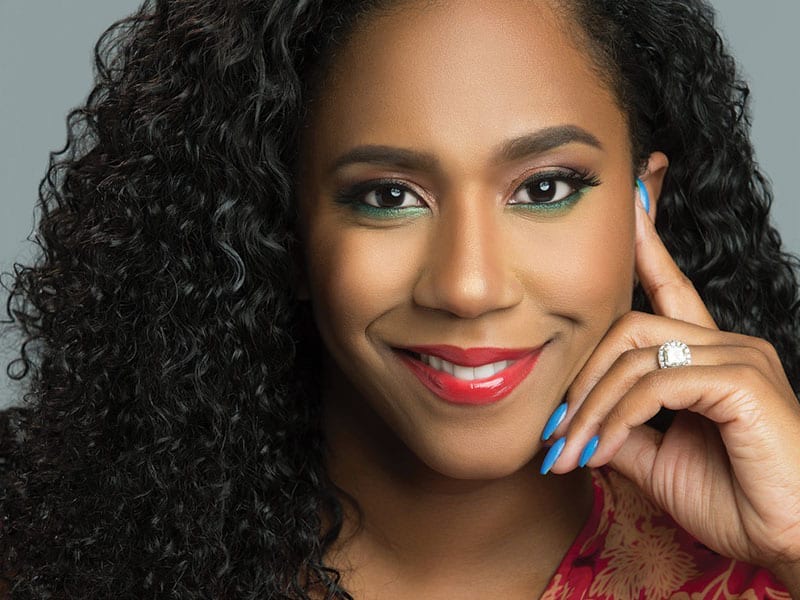By Natalie Walters
The Dallas Morning News
WWR Article Summary (tl;dr) Mahisha Dellinger is the founder and CEO of Black haircare brand “Curls.” Dellinger shares her journey to the top of the haircare industry.
Dallas
Eighteen years ago, Mahisha Dellinger was disappointed in the greasy products for curly hair in the ethnic aisles she scoured in her off hours from her day job as a marketing manager at Intel Corp. in California
She ended up putting about $35,000 of her savings to start Black hair care brand Curls. She was betting other women also wanted gentle, organic hair products for natural curls, she said.
In 2014, she relocated her company to Frisco. It was a world away from her upbringing in extreme poverty in Sacramento, where she watched her brother join a gang that led to drive-by shootings at their home. She decided she didn’t want herself or her future family to live like that.
Today, Curls products are sold in Target, Walmart and Bed, Bath & Beyond and its celebrity fans include Halle Berry, Alicia Keys and Blair Underwood. Dellinger also starred in OWN Network’s 2018 show Mind Your Business with Mahisha.
Dellinger, 47, will offer up her best branding tips Tuesday at Dallas Startup Week’s Women of Innovation program. Her free virtual event is at 11:30 a.m.
Started from the bottom
Dellinger still remembers the fear she felt growing up in an area known as Danger Island. Like the time her home was shot at when a rival drug gang retaliated against her brother.
“It was a very dark place,” she said.
But from an early age, Dellinger got a picture of how the other half lives. While she primarily lived with her mother, her dad would sometimes pick her up for the weekend. She noticed that when she was with him, they could go out to eat and go shopping. He also took her to museums and to hear different political speakers so she had Black role models.
“I didn’t like living like my mother,” she said. “It wasn’t comfortable.”
So she made a plan. Whatever her mother’s family did, she would do the opposite. Most didn’t graduate high school; so she did. They didn’t go to college; so she supported herself through California State University at Sacramento and graduated with a degree in business administration and marketing. She landed an IT marketing internship at Intel.
“Education was the No. 1 change for me that shifted my lifestyle,” she said. “It got me experience, which got me different level paying jobs.”
While working at Intel, Dellinger became increasingly frustrated with hair care options at Target and started experimenting with Paul Mitchell and Pantene products, as well as blended oils. In 2002, she launched four products largely from her garage workspace and ended the year with a profit of $86,000. Her company has never been in the red.
Five years later, it passed $1 million in sales and scored a partnership with Target. Dellinger declined to disclose Curls’ annual revenue but industry experts estimate it generates $50 million in annual sales. She has 20 regular employees and 200 contractors.
Dellinger moved her company to North Texas for the reasons many do: lower costs, a skilled labor force and a better quality of life for her family, including her four children, ages 9, 15, 16 and 25. And her manufacturing plant was already in Dallas.
Typically, her best-selling products are stylers like gel and mousse. But this year, with everyone staying home, that shifted dramatically. Now those are at the bottom of the list while everyday cleansers and conditioners are at the top.
“I understand because I’ve been rocking a mommy bun and no makeup since COVID started,” she said with a laugh.
A year of reckoning
Dellinger has now become a Black role model herself. A few years back, Oprah’s network approached her about a show where she would help struggling female entrepreneurs by giving them advice and guidance. It premiered in fall 2018. She also started Black Girls Making Millions Academy, a mentorship program to help other Black women achieve their dream. Its retreat sold out in 30 minutes last year.
As a prominent Black business owner, her team joined the recent conversation about systemic racism in the U.S. by posting a sponsored ad on June 3 that showed her in a five-minute Parent magazine ad. The ad showed Dellinger at the dinner table with her family. It has over a million views but it wasn’t all positive attention.
“It was a positive uplifting message about success against all odds for an African American woman but the amount of hatred received on that post was … ,” she said, letting the sentence trail off.
Some comments were so offensive her team deleted them. Others, they left and responded, trying to be educational and positive.
This year of protests brought racism in America back to the forefront, but Dellinger said it never really went away.
“It just resurfaced,” she said. “It feels like the early ’50s.”
And the protests have affected her deeply.
“Whenever I sit next to someone, I think, ‘Are they OK or not,’” she said. “I never thought that way before. It’s a whole other level of awareness.”
___
Distributed by Tribune Content Agency, LLC.














































































































































































































































































































































































